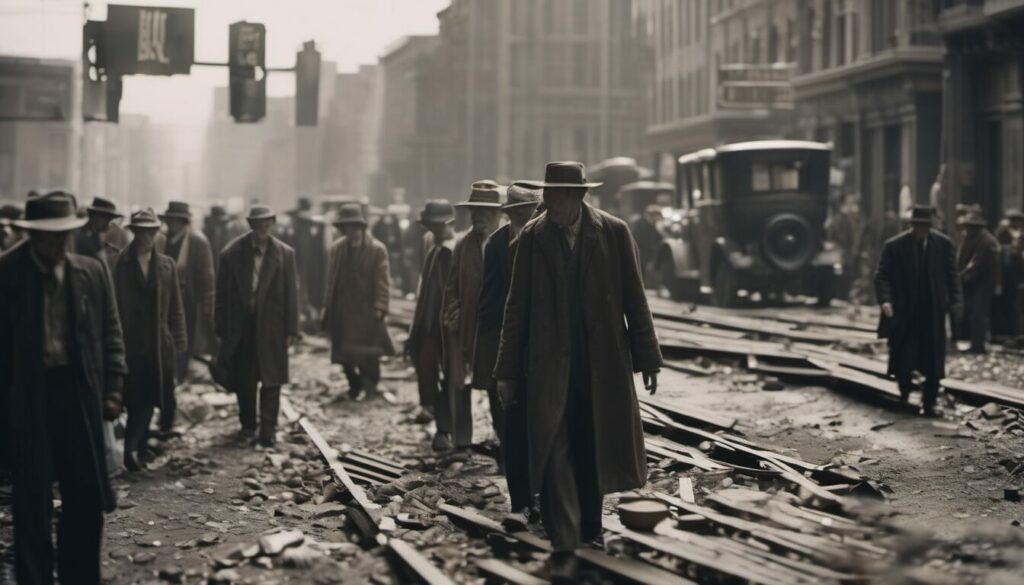The Great Depression of the 1930s was a major event in modern history, changing economies, societies, and politics worldwide. Lasting over ten years, it brought widespread unemployment, poverty, and economic hardship, leaving a lasting impact on people everywhere. In this detailed examination, we dive into the many aspects of the Great Depression, exploring where it came from, its various causes, how it affected the world, and its long-lasting consequences. By looking closely at this time, we hope to better understand why one of the biggest economic crises in history happened and how it still influences societies today.
Overview:
Understanding the Great Depression requires looking at the broader history and economy of the early 20th century. After World War I, European countries faced huge war debts, reparations, and infrastructure damage. The Treaty of Versailles in 1919 imposed heavy reparations on Germany, causing economic instability. Meanwhile, the United States, less affected by the war, saw a time of seeming prosperity in the 1920s.
This period, known as the “Roaring Twenties,” saw remarkable economic growth, technological advances, and cultural vibrancy in the United States. There was a big expansion in industry, helped by new manufacturing methods like those by Henry Ford. The car industry, especially, grew a lot during this time, representing progress and innovation.
New technologies, like electricity in homes and new consumer products such as radios and refrigerators, changed daily life and led to a culture of buying. Mass media, like radio and movies, made people feel more connected and shared a common culture.
But underneath this prosperity were problems that led to the Great Depression. The use of credit expanded rapidly, and the stock market saw a lot of risky investment. People thought they were rich, but it was all unstable. Many people didn’t earn much while a few got very rich, making wealth very unequal.
By the end of the 1920s, there were signs that things were not as good as they seemed. There was too much stuff being made, but not enough people buying. The stock market had gone too high, and it was going to crash. This set the stage for the Great Depression that would hit the world hard.
Causes:
The Great Depression was a massive economic downturn that had devastating consequences for many people around the world. It happened because of several reasons that all came together at the same time. One big reason was that people were investing a lot of money in the stock market, hoping to make a quick profit. They were borrowing too much money to buy stocks, which made the prices go up really high. But this was like building a house on sand because it wasn’t stable. When the stock market crashed on October 29, 1929, known as Black Tuesday, it caused a lot of panic. People started selling their stocks as fast as they could, and this made the prices drop very quickly. Many people lost a lot of money, and this affected the whole economy.
Another problem was that the economy had some weaknesses that made it vulnerable to a big shock. For example, there was too much stuff being made, but not enough people could afford to buy it. Even though there were a lot of cool new things like radios and refrigerators, most people didn’t have enough money to buy them. Also, the rich people had most of the money, so they weren’t spending it like they could have. This made it harder for businesses to sell their products, so they had to cut down on production and lay off workers.
The banks also had problems because they were taking too many risks with people’s money. They were lending money to people who wanted to invest in the stock market, even though it was risky. When the stock market crashed, many people lost all their money, and they wanted to take it out of the banks. This caused a lot of banks to go bankrupt because they didn’t have enough money to give back to their customers. People lost confidence in the banking system, so they stopped putting their money in the banks. This made the banks even weaker, and they had to close down.
The Great Depression wasn’t just a problem for the United States. It affected countries all over the world because they were connected through trade. When the United States economy crashed, it caused problems for other countries too. Many countries depended on the United States for money and goods, so when the economy went bad, they suffered too. Also, countries started putting up barriers to trade, like tariffs, which made it even harder for businesses to sell their products overseas.
The Great Depression was a complicated problem that happened because of many different things. It showed how dangerous it can be when people take too many risks with money and when the economy isn’t balanced. It also showed how important it is for countries to work together to solve big problems. By understanding what caused the Great Depression, we can learn how to prevent it from happening again in the future. We can make sure that the economy is strong and stable, so that everyone can have a chance to prosper.
Effects:
The Great Depression was a really big deal in history. It changed a lot of things in the world. It lasted from the late 1920s to the 1930s and affected societies, economies, and politics all over the world. Its effects were so big that we still feel them today. Here are some of the most important things that happened because of it:
Unemployment and Poverty:
The Great Depression caused a lot of people to lose their jobs. Businesses closed down, and industries stopped working, leaving millions without work. Families struggled to pay for things like rent and food. Many even faced being kicked out of their homes and going hungry or not having a place to live.
A lot of people suffered because of unemployment and poverty during this time. There wasn’t enough help available to support everyone who needed it. People had to wait in long lines for food and basic supplies at places like soup kitchens. This made life really tough for families trying to get by.
Not having a job for a long time and not being sure about the future made many people feel really bad. They felt hopeless and lost, not knowing what to do. It was a really hard time for a lot of people, and it affected communities all over the world.
Social Dislocation and Political Unrest:
The Great Depression caused a lot of problems in society and politics. Many people were unhappy and wanted things to change. The old ways of doing things didn’t work anymore, and this caused a lot of trouble.
In some countries, people lost trust in their leaders and the way things were run. This made some people turn to extreme ideas and leaders who promised quick fixes to their problems. In Europe, leaders like Adolf Hitler in Germany and Benito Mussolini in Italy took advantage of this discontent. They promised to bring stability and prosperity, but their methods were extreme and often oppressive.
At the same time, socialist movements grew as workers tried to stand up for their rights. They wanted a fairer society where everyone had a chance to succeed.
Global Economic Restructuring:
The Great Depression changed how governments thought about the economy. They had to come up with new ideas to deal with the crisis. In the United States, President Franklin D. Roosevelt introduced a bunch of new programs called the New Deal. These programs were all about the government stepping in to help.
The New Deal had lots of different parts. It included things like building roads and bridges to create jobs, making rules to keep banks and businesses in check, and giving support to people who were struggling. These programs helped millions of Americans who were hit hard by the depression. They also changed how the government worked with the economy, making sure people were taken care of during tough times.
Legacy of Economic Trauma:
The Great Depression left a lasting impact on the world. Even after the economy got better, its effects stuck around. It changed how people thought about money, risk, and how much the government should get involved in the economy.
The Great Depression taught us important lessons about what happens when things go wrong with the economy. It showed us the dangers of letting things like risky investments, inequality, and not doing anything about problems get out of control. Learning from these mistakes can help us build a fairer and stronger future.
The Great Depression was a big moment in history. It affected everything from jobs and money to how countries were run. Its influence is still felt today. Understanding what caused it and what happened because of it can teach us a lot about dealing with economic crises and why it’s important for leaders to take action.
In conclusion, the Great Depression was a major turning point in history. It showed us how fragile economies can be and how much damage financial crises can cause to societies and countries. Its reasons were complicated and involved a mix of economic, social, and political issues that led to a worldwide disaster. But even in the tough times, the Great Depression also brought out qualities like strength, unity, and new ideas as people worked together to face the problems. Looking back on this hard time, we learn important lessons about being careful, thinking ahead, and taking action to prevent similar crises in the future. By remembering these lessons, we can aim to create a better, fairer, and more prosperous world for the next generations.










More Stories
Alexander the Great: A Legacy Unparalleled
The Mauryan Era: India’s first great empire
Battle of Verdun: The Longest Battle of World War I